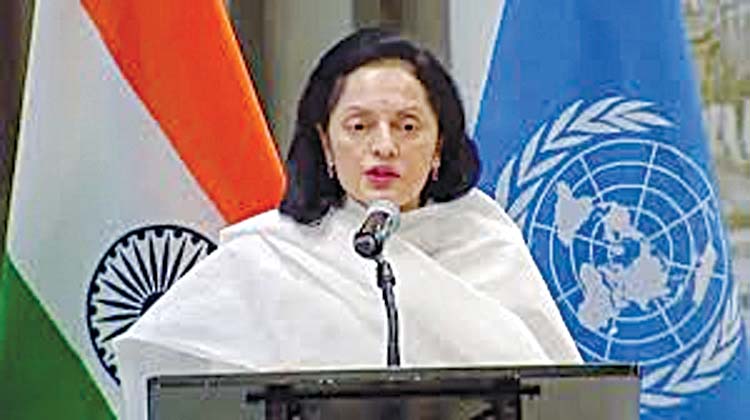United Nations/New Delhi, May 3 (Representative) India highlighted its syncretism and pluralistic culture and traditions and its commitment to peace at the UN General Assembly, even as it slammed Pakistan for going against the collective efforts of the UN members due to its “destructive and pernicious nature”. Retorting against Pakistan’s UN envoy Munir Akram’s anti-India remarks at the UN, India’s Permanent Representative to the UN Ruchira Kamboj said:“As we endeavour to cultivate a culture of peace amid these challenging times, our focus remains steadfast on constructive dialogue. We thus choose to set aside the remarks from a certain delegation, which not only lack decorum but also detract from our collective efforts due to their destructive and pernicious nature.”“We would strongly encourage that delegation to align with the central principles of respect and diplomacy that must always guide our discussions. Or is that too much to ask of a country that harbours a most dubious track record on all aspects in itself?,” she said, in stinging remarks on Thursday.
Alam, in his anti-India remarks at the UN General Assembly meeting on ‘Culture of Peace’, had made references to Kashmir, the Citizenship (Amendment) Act and the Ram Temple in Ayodhya.Elaborating on India’s pluralism, Ruchira Kamboj said: “With its remarkable religious and linguistic diversity, India’s cultural mosaic is a testament to tolerance and coexistence. Festivals such as Diwali, Eid, Christmas and Nowruz transcend religious boundaries, celebrating shared joys among diverse communities.”“The country’s myriad languages, dialects and cuisines, alongside its rich tapestry of races, colours and landscapes, contribute to the resilience and richness of our composite culture.”Referring to India’s syncretism, she said: “India is not only the birthplace of Hinduism, Buddhism, Jainism and Sikhism, but also a stronghold for Islam, Judaism, Christianity and Zoroastrianism. It has historically been a refuge for persecuted faiths, illustrating its long-standing embrace of diversity.”She said the doctrine of Ahimsa championed by Mahatma Gandhi continues to be a bedrock of India’s commitment to peace.“We are particularly concerned by the escalating attacks on sacred sites, including churches, monasteries, gurudwaras, mosques, temples and synagogues.
Such acts require a swift and united response from the global community,” she added.“It is crucial that our discussions therefore forthrightly address these issues, resisting political expediencies. We must tackle these challenges directly and ensure that they are central to our policy, dialogues and international engagements,” she said.“Terrorism stands in direct opposition to the culture of peace and the core teachings of all religions, which advocate compassion, understanding and coexistence.“It sows discord, breeds hostility and undermines the universal values of respect and harmony that underpin cultural and religious traditions worldwide. It is essential for Member States to work together actively to nurture a genuine culture of peace and to view the world as a united family, as my country strongly believes,” she added.

